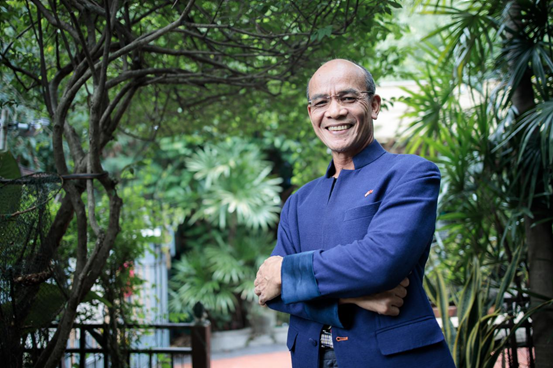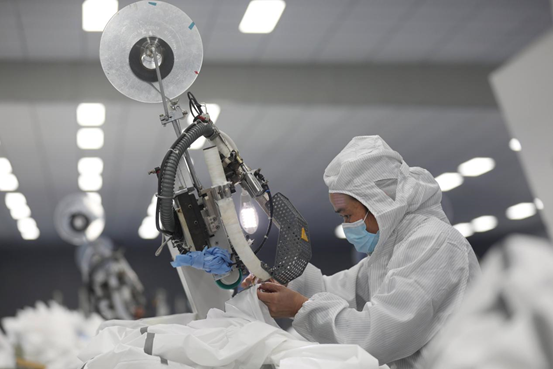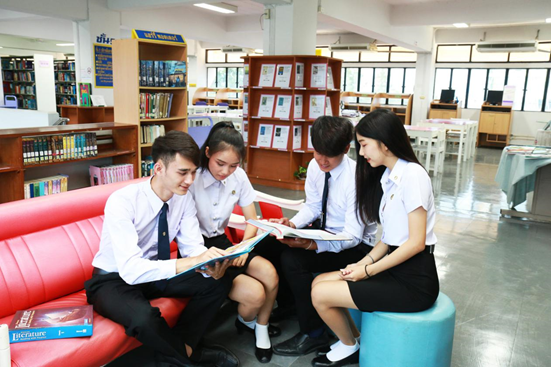

“China-Thailand relations over the past 45 years is particularly commendable. Despite the differences in political system, economy and society, the two sides have always understood and supported each other on the basic principle of seeking common ground while reserving differences.” In an interview with TAP, General Surasit Tanadtang, Director of the Thai-Chinese Strategic Research Center, said that 45 years ago, thanks to the courageous adjustment by the Thai government in their foreign policy and the broad mind of the Chinese government, the year 1975 witnessed the resumption of normal diplomatic relations between Thailand and China and a new chapter of the bilateral relationship. As a result, Thailand shifted its foreign policy focus from the West to China and the East.
Over the past 45 years, despite differences between the two countries in various aspects, the governments and people of the two countries have always shared weal and woe and joined hands with each other, deepening pragmatic cooperation between the two sides. More importantly, the strategic cooperation between the two countries has been enhanced to a new level. General Surasit Thanadtang believed that in the new diplomatic situation, the cooperation between China and Thailand would develop in a stable and healthy manner.

Challenges in the post-COVID-19 era
The COVID-19 has had a profound impact on international relations. When asked what geopolitical changes will be caused, General Surasit Thanadtang argued that globalization has not come to an end after the pandemic, but the way of cooperation has been changed. Countries in the region that are cooperating with China will continue to maintain their close ties and carry out more cooperation at the international political domain in the future.
“The joint battle against the COVID-19 pandemic can further solidify our regional international relations and enhance mutual trust in some fields, such as national quarantine, and the parties can make use of this to expand cooperation areas,” said General Surasit Thanadtang. He also believed that with the increasingly important role of the ASEAN, Thailand should work together with ASEAN to create greater overall regional interests.
Regarding China’s investment in Thailand and the promotion of the construction of the Eastern Economic Corridor (EEC), General Surasit Thanadtang believed that, previously, the investment from China have increased significantly. Although the pandemic would have a short-term impact on Chinese investment, China is still enthusiastic about investing in Thailand, and Chinese enterprises would continue to invest in the EEC. Thailand should make full use of its geographical position to seek opportunities and spaces for win-win cooperation.
In terms of common growth with China, General Surasit Thanadtang suggested that Thailand should pay attention to two aspects: economic growth and mutual growth.
There are still many rooms where China and Thailand can expand practical cooperation in industrial innovation and digital economy development. As 2020 has been designated as the Year of ASEAN-China Digital Economy Cooperation by the leaders of China and ASEAN countries, their cooperation in the digital field will be further strengthened.
In agriculture, Thailand should aim to produce products that China cannot produce, or those in great demand in the Chinese market, such as jasmine rice and durian. In terms of knowledge and human resources, the principle of extensive consultation, joint contribution and shared benefits should be followed.
China is promoting the building of a community of shared future for mankind through the Belt and Road Initiative. According to General Surasit Thanadtang, Thailand should actively work out cooperation plans and consider how to put a community of shared future into effect. For example, Thailand should establish a security alliance with China, which means cooperation not only can be achieved in military and national defense, but also in food security, health care and public health and other aspects.

Over the past 45 years since the establishment of diplomatic relations, China and Thailand have been closely linked in various fields and at all levels, from the Thai royal family and government to private enterprises and people. In terms of academic exchanges, Thailand should make full use of China’s rich resources in thin-tank and academic researches so as to further deepen and expand relevant cooperation in order to formulate strategies in line with national development.
According to General Surasit Thanadtang, China’s the Belt and Road Initiative has brought more opportunities for cooperation between the two countries in five areas: comprehensive policy communication, steady progress in facilities connectivity, smooth trade flow, growing capital flows, and a deep-rooted people-to-people relationship.
“There are differences between Thailand and China in terms of polity, economy, society and culture, but on the principle of seeking common ground while reserving differences and mutual trust, the relations between the two countries will withstand the test of time and various challenges no matter what changes are taking place in the international situation,” said General Surasit Thanadtang.
Opportunities from China’s major and favorable policies
With regard to China’s policy and the opportunities and challenges facing Thailand, after analyzing the 19th National Congress of the Communist Party of China and the two sessions this year, General Surasit Thanadtang considered the following points are worth noting.
Although it is merely an issue of China’s internal policy on its resolutely cracking down on corruption, the international cooperation in anti-corruption is needed to be strengthened. In this respect, Thailand should learn from China in its experience and lessons.
China’s the Belt and Road construction is based on the principle of co-consultation, co-construction and sharing, and is moving economic globalization forward. In order to formulate policies in line with national development, Thailand should establish research teams and think tanks, which is also a great challenge for Thailand.

This year’s two sessions were somewhat unique in which China does not set a GDP growth target, demonstrating a national development approach that is not constrained by the highly valued GDP values of western countries, and focusing on poverty alleviation and improving people’s purchasing power. Likewise, the expansion of the new space for international cooperation in the Belt and Road, including the establishment of the Asian Infrastructure Investment Bank, and the promotion of new economic integration, such as the Regional Comprehensive Economic Partnership Agreement (RCEP).
While China has internationalized its education system by reforming its education system and establishing partnerships with first-class international educational institutions in an effort to develop China into an international education center, Thailand should take this opportunity to adjust its education system and join hands with China for common development, which is also a challenge for Thailand.
China attaches great importance to its public health system, especially when China enters an aging society. In addition, China leads the world in the manufacture of medical devices and public health equipment, while Thailand has a good public health system, ranking first in Asia and sixth in the world in terms of health and safety, for which the two sides can expand cooperation.
With green economy policy, China emphasizes the integrated development of economy, society and environment, including manufacturing industry and consumption, and provides green development ideas for countries.Thailand should learn from.
China’s goal is to enter the ranks of innovative countries and focus on technology research and development. For example, Huawei has 80,000 R&D personnel worldwide. Although Thailand is not yet in the league of innovative countries, it can position itself as a user of innovative technology and can follow in the footsteps of King Rama V by attracting foreign experts to work in Thailand.
Source: Thailand’s TAP
Editor in Charge: Li Min
桂ICP备14000177号 Copyright@2006-2013 Guangxi China-ASEAN Panorama Magazine Agency Co., Ltd. All Rights Reserved